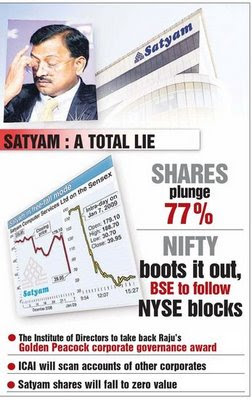Satyam Computers chief B. Ramalinga Raju admits fraud

Ramalinga Raju may face 10 year jail Satyam Computers’ chief, B. Ramalinga Raju, ambushed investors and Corporate India on Wednesday, admitting to long-running fraud of about Rs 8,000 crores in accounting and said the company did not have the money that it had claimed it had. He resigned later, saying his last-ditch efforts to fill the “fictitious assets with real ones” through the attempt to acquire Maytas failed. Mr Raju, who faces arrest, added that no other board member was aware of the financial irregularities. His brother and managing director, Mr B. Rama Raju, stepped down as well, days ahead of its January 10 board meeting. Mr Raju will still be the chairman of Satyam Computers till the board is expanded. The news sent Satyam shares and the equity markets into a tailspin. The stock lost 90 per cent wip ing off more than Rs 10,000 crore market capitalisation. Trading in Maytas Infra was stopped because of the size of its fall. The New York Stock Exchange halted trading in Satyam...
